

AI Tools for Non-English Website Optimization
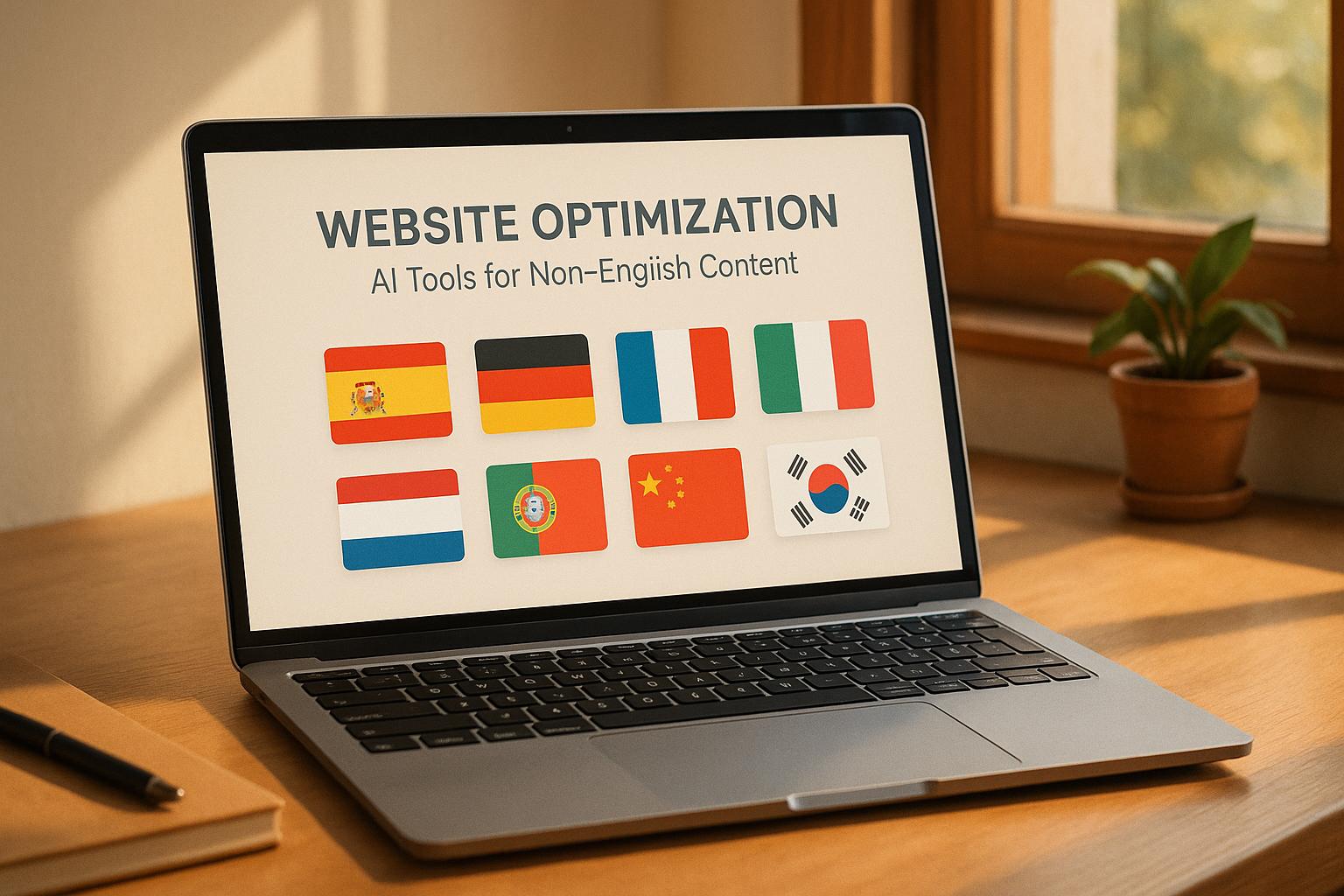
AI Tools for Non-English Website Optimization
 20-10-2025 (Last modified: 23-10-2025)
20-10-2025 (Last modified: 23-10-2025)
70% of online searches happen in native languages, yet only 2% of websites are optimized for multilingual SEO. This gap presents a huge opportunity for businesses to connect with international audiences. But managing multilingual content manually is time-consuming, error-prone, and can lead to poor translations that hurt search rankings.
AI tools are changing the game by automating translation, keyword research, and localization. These platforms don’t just translate – they analyze user intent, improve engagement, and optimize content for specific regions and search engines like Google, Baidu, and Yandex.
Key Tools to Consider:
- PageTest.AI: Simplifies conversion testing for multilingual audiences with AI-driven content variations and performance tracking.
- Peec AI: Focuses on precise translations and tailoring content for regional preferences.
- WPML: A WordPress plugin offering easy translation management for over 40 languages.
- SEMrush: Excels in multilingual keyword research and SEO performance tracking.
- Ahrefs: Offers robust tools for global keyword research and content performance analysis.
Quick Comparison:
| Tool | Best For | Pricing (USD) | Multilingual Support | Key Features |
|---|---|---|---|---|
| PageTest.AI | Conversion optimization | $10–$200/month | Yes | A/B testing, AI content variations |
| Peec AI | Translation/localization | Custom pricing | Yes | Context-aware translations |
| WPML | WordPress translations | $39+/year | 40+ languages | Manual/automated translations |
| SEMrush | Multilingual SEO | $129.95+/month | 130+ countries | Keyword research, SEO analytics |
| Ahrefs | Global SEO performance | $99+/month | 170+ countries | Keyword research, backlink analysis |
Takeaway:
Combining tools like PageTest.AI for testing, SEMrush or Ahrefs for SEO, and WPML for translations creates a strong strategy. While AI simplifies the process, human oversight is still crucial to ensure accuracy and relevance for different audiences.
Top 5 AI Tools for Translating and Localizing Marketing Content | Comparison & Use Cases
1. PageTest.AI
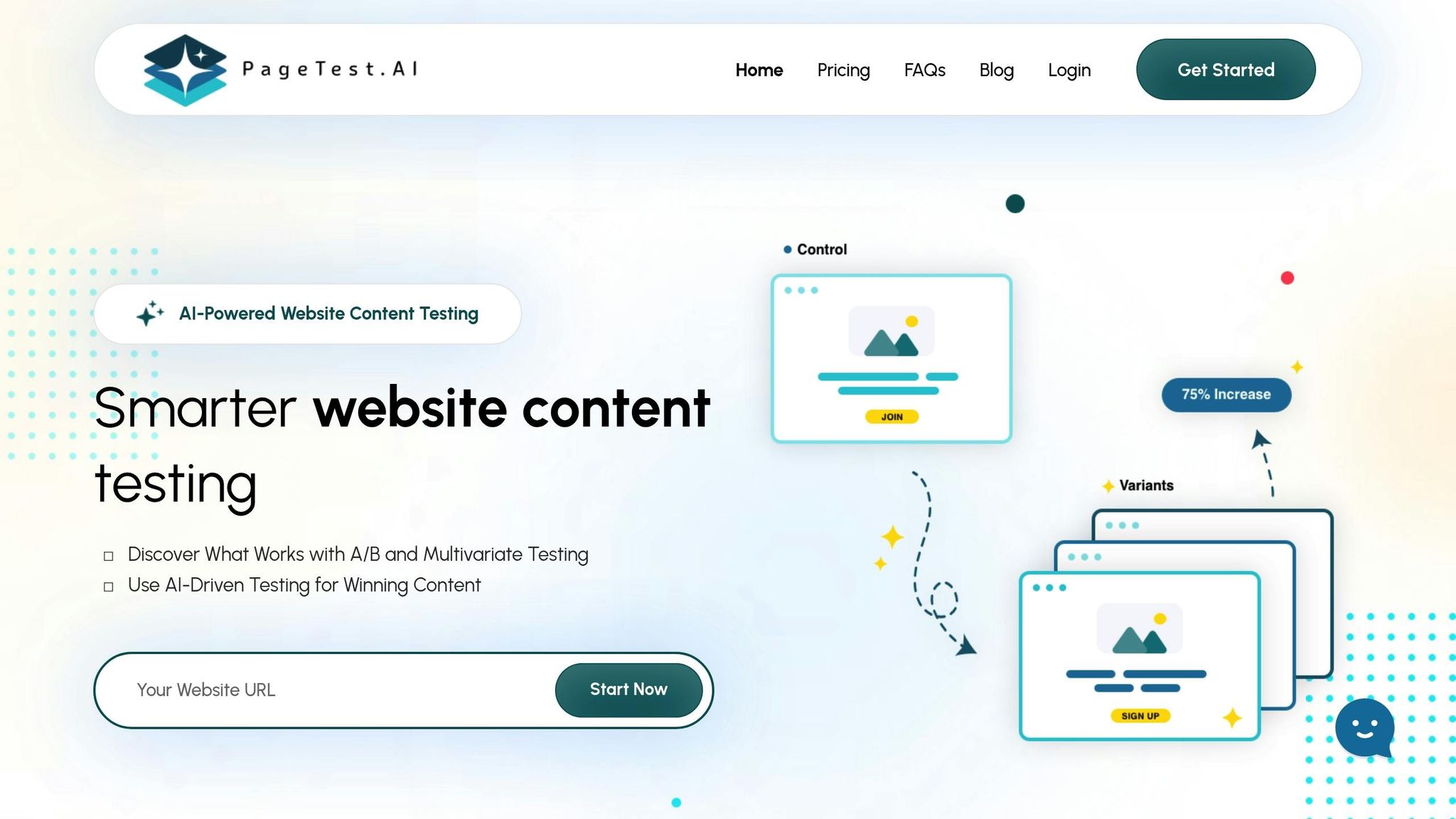
PageTest.AI is an AI-driven platform designed to simplify conversion rate optimization, particularly for businesses targeting non-English-speaking audiences. By using artificial intelligence, it takes the guesswork out of website optimization, making the process manageable even for teams without extensive technical know-how.
Multilingual Support
PageTest.AI helps website owners fine-tune their content for non-English audiences by generating variations of headlines, calls-to-action, button text, and product descriptions. It supports A/B and multivariate testing across different language versions, automatically creating and testing multiple variations. This approach delivers clear insights into which content resonates most and drives better engagement and conversions.
Content Adaptation
This platform goes beyond mere translation. It uses AI to generate content that reflects the subtleties of different languages and cultures. Whether it’s a product description or a call-to-action, these localized versions are designed to be both culturally relevant and effective. This thoughtful adaptation lays the groundwork for more accurate performance analysis.
Performance Tracking
PageTest.AI monitors key metrics like clicks, user engagement, and behavior for every content variation. By analyzing details such as time spent on the page, scroll depth, and click events, it provides a complete picture of user interactions. These insights help businesses identify the best-performing content tailored to specific languages, allowing for further optimization.
Integration Options
The platform offers seamless integration with popular website builders through a no-code setup. Additionally, its Chrome extension allows users to test and tweak content directly from their browser, adding another layer of convenience.
Pricing
PageTest.AI provides flexible pricing options in US dollars, catering to businesses of all sizes:
| Plan | Monthly Cost | Test Impressions | Pages | Tests | Websites |
|---|---|---|---|---|---|
| Trial | $0 | 10,000 | 5 | 5 | 1 |
| Startup | $10 | 10,000 | 10 | 10 | 1 |
| Enterprise | $50 | 100,000 | 100 | 100 | 10 |
| Agency | $200 | 1,000,000 | Unlimited | Unlimited | 100 |
This pricing structure ensures that businesses – whether small startups or large agencies – can find an affordable plan to meet their multilingual optimization needs.
2. Peec AI
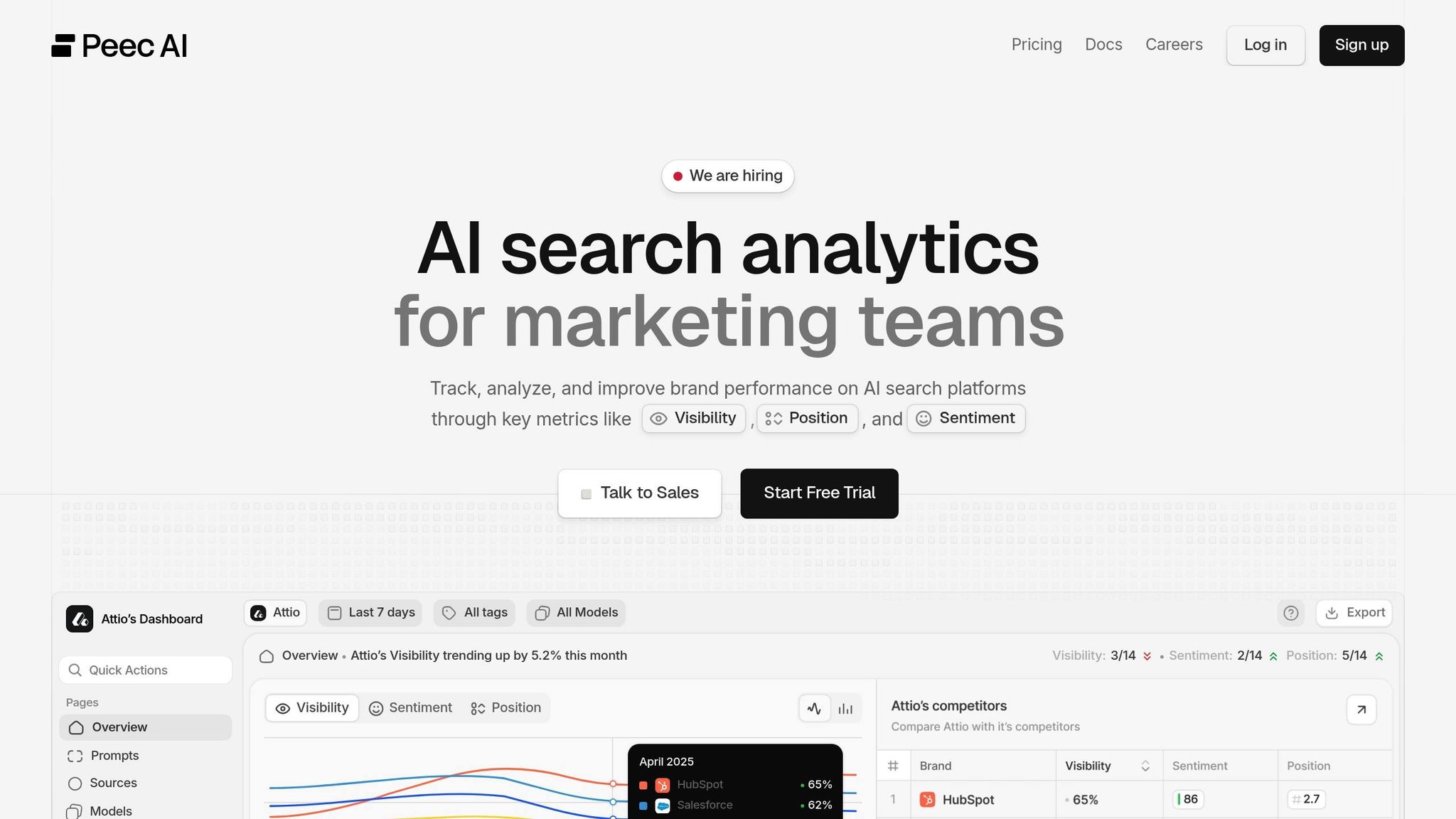
Building on the strategy of PageTest.AI, Peec AI takes localization a step further by tackling language barriers head-on. Its tools focus on precise translation and adapting content to align with regional preferences.
Multilingual Support
Peec AI handles the translation and localization of both static and dynamic website elements. Using AI-driven methods, it ensures translations are not only accurate but also maintain proper context and regional relevance. This includes adhering to SEO best practices and tailoring content to specific language variations, helping businesses connect with local audiences effectively.
Content Adaptation
Beyond basic translation, Peec AI fine-tunes content for local dialects, idiomatic expressions, and cultural subtleties. This involves adjusting keywords, phrases, and even visual components to align with the preferences of specific audiences. Such detailed customization boosts user engagement and minimizes the risk of cultural mismatches. To maintain accuracy and sensitivity, a human-in-the-loop process is employed for reviewing and refining the localized content.
Performance Tracking
Peec AI doesn’t stop at localization – it monitors how well the localized content is performing. Key metrics such as user engagement, conversion rates, bounce rates, and search rankings are tracked for each language version. These insights help website owners identify what’s working and where improvements are needed. For example, making tailored adjustments to localized content has been shown to significantly increase traffic and conversions.
Integration Options
Peec AI integrates smoothly with platforms like WordPress, Shopify, and custom CMS setups. Whether through plugins, APIs, or no-code solutions, the integration process is designed to be quick and hassle-free. This allows businesses to focus on refining their content strategy rather than dealing with technical challenges.
Pricing
Peec AI offers flexible pricing plans, structured around the number of languages, website pages, and additional features required. Options include monthly, annual, or custom enterprise plans. Since detailed pricing isn’t publicly listed, businesses are encouraged to reach out directly to Peec AI for a personalized quote.
3. WPML
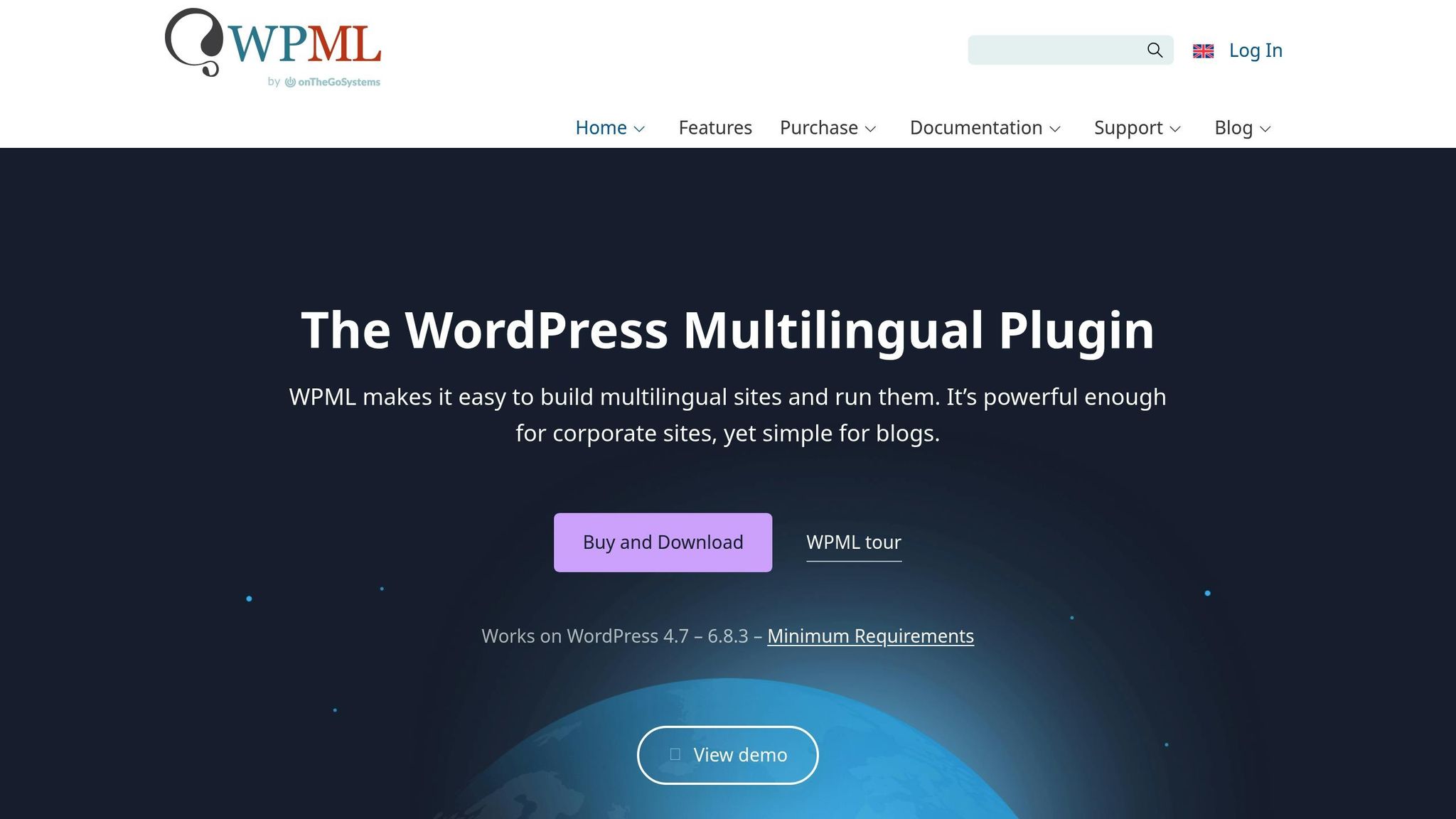
WPML transforms WordPress sites into multilingual hubs, making it a go-to choice for businesses that rely on this platform.
Multilingual Support
With support for over 40 languages, WPML covers a wide range of global and regional dialects. Beyond that, it allows users to create custom languages or tailor specific variants for niche markets. This flexibility is key for connecting with diverse, non-English-speaking audiences.
Content Adaptation
One of WPML’s standout features is its focus on localizing content. It goes beyond simple translation by incorporating local expressions, cultural nuances, and region-specific terminology. This ensures your content feels authentic and relatable to the target audience. Plus, its translation management system streamlines collaboration, helping teams produce high-quality, locally relevant content.
This localization effort pairs smoothly with tools for monitoring performance.
Performance Tracking
While WPML doesn’t include its own analytics, it integrates seamlessly with tools like Google Analytics. This integration allows users to monitor metrics like page views, bounce rates, and conversions for each language version. These insights help measure how well translations are performing and how audiences in different regions are engaging with your content.
sbb-itb-6e49fcd
4. SEMrush
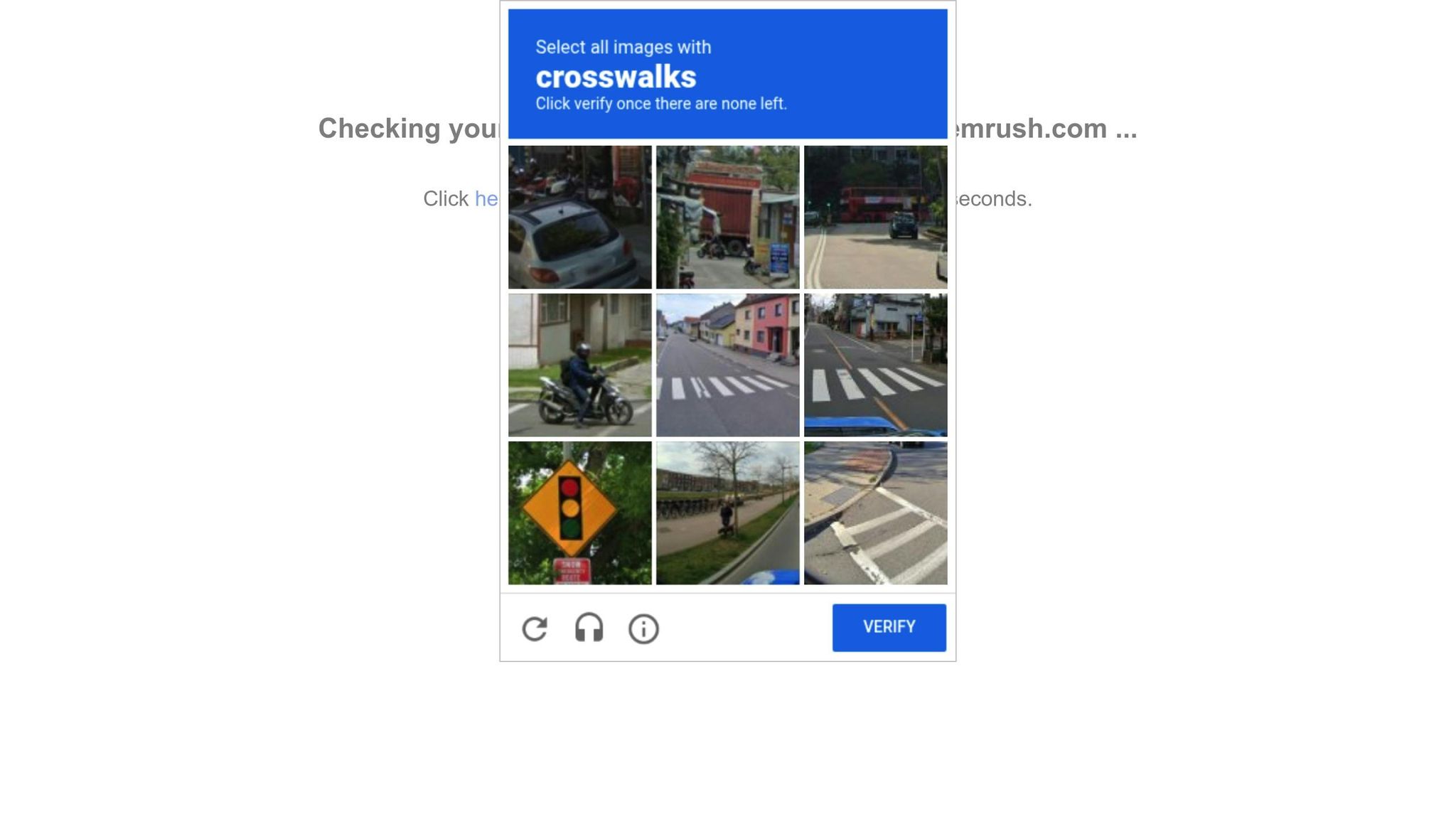
SEMrush stands out as a powerful tool for businesses aiming to optimize their websites for a global audience. With access to a database boasting over 25 billion keywords across 130+ countries, it provides the insights needed to expand internationally.
Multilingual Support
SEMrush excels in keyword research for multiple languages and regions, making it a go-to option for businesses targeting non-English-speaking markets. The Keyword Magic Tool generates localized keyword suggestions based on actual search behaviors, offering a tailored approach to content creation. Additionally, its position tracking feature lets users monitor keyword rankings across different countries and languages. For instance, businesses can compare how their Spanish content performs in Mexico versus Spain, gaining valuable regional insights.
Content Adaptation
The platform’s SEO Writing Assistant goes beyond basic translation, helping adapt content to match local search intent and trends. It provides recommendations on readability, tone, and semantic relevance, ensuring content resonates with native audiences. This feature helps businesses avoid the common mistake of relying solely on direct translations, which often fail to capture the nuances of local language and culture.
Performance Tracking
SEMrush offers comprehensive tools for tracking multilingual performance, covering metrics like organic traffic, keyword rankings, backlink profiles, and overall site health. Its dashboard is user-friendly and displays data in formats familiar to U.S. users, such as currency and date layouts. A practical example: a U.S.-based e-commerce company used SEMrush to increase its Spanish organic traffic by 30% in just six months.
Integration Options
To streamline workflows, SEMrush integrates seamlessly with major platforms like WordPress, Google Analytics, and Google Search Console. These integrations enable automatic data sharing and consolidated reporting, making it easier to manage multilingual campaigns across various tools.
Pricing
SEMrush offers three pricing plans tailored to different business needs:
- Pro Plan: $129.95/month, ideal for small teams managing basic multilingual SEO tasks.
- Guru Plan: $249.95/month, includes content marketing tools and access to historical data.
- Business Plan: $499.95/month, designed for large enterprises and agencies, offering API access with extended limits.
Trusted by over 10 million marketing professionals, SEMrush is used by major brands like eBay, Quora, and Booking.com. According to a 2024 survey, 72% of international marketers rank SEMrush as their top tool for multilingual SEO campaigns.
5. Ahrefs
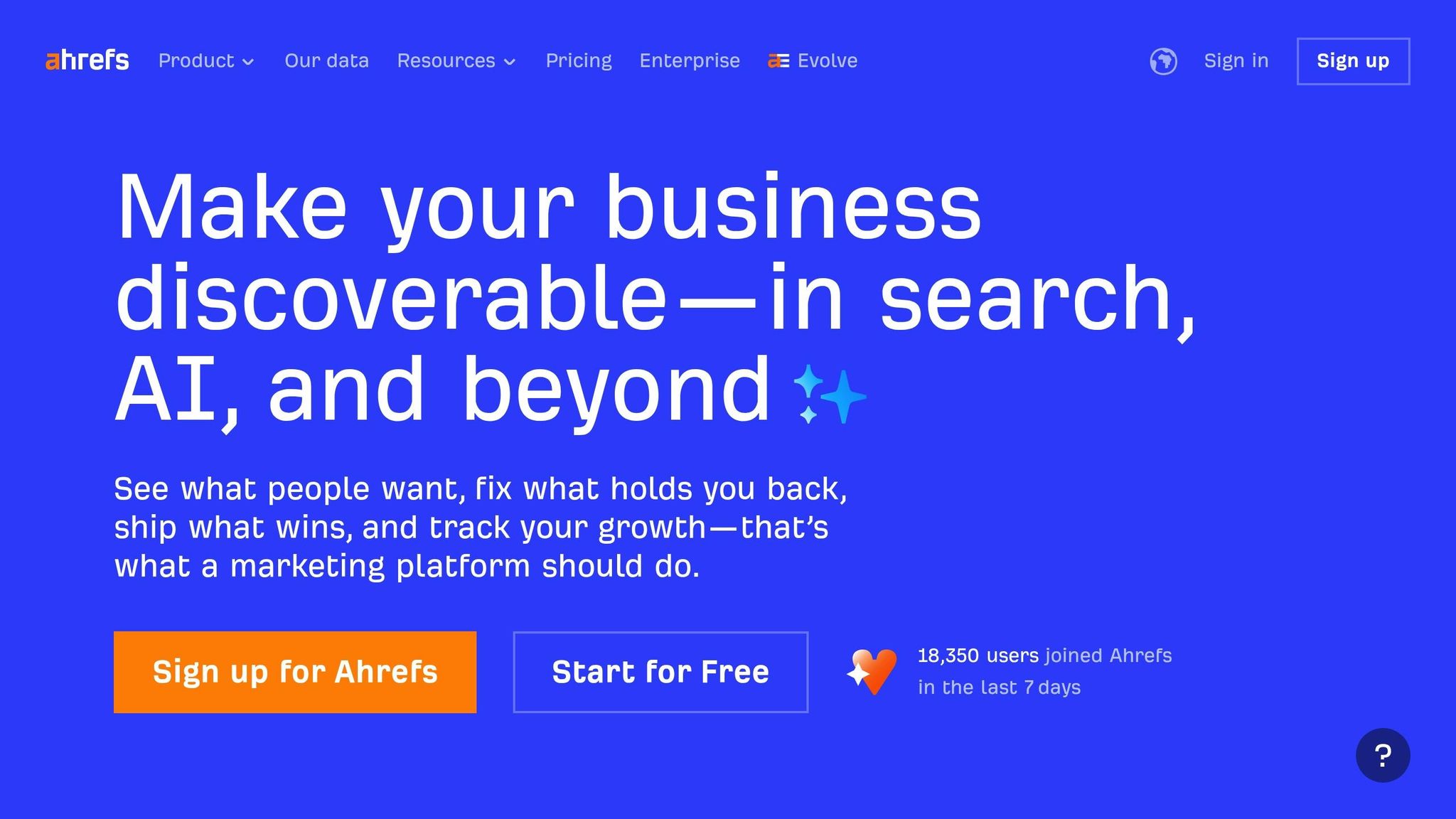
Ahrefs stands out as a powerful SEO platform tailored for optimizing international websites. With a massive database of over 12 billion keywords and 400 billion indexed pages, it offers extensive multilingual tools to support global SEO efforts.
Multilingual Support
Ahrefs’ Keywords Explorer allows users to perform keyword research in more than 170 countries and in multiple languages, making it an ideal tool for international SEO campaigns.
Content Adaptation
Ahrefs simplifies content localization by providing localized keyword data, detailed search volume insights, and SERP analysis across different languages and regions. Its Content Explorer feature is particularly useful for identifying top-performing content in specific languages, offering valuable guidance for localization strategies. For instance, if a U.S.-based e-commerce business is expanding into Spain, they can use Ahrefs to find high-volume Spanish keywords, analyze local competitors’ top-ranking content, and pinpoint content gaps. This approach helps create content that resonates with local audiences and aligns with their search behaviors.
Performance Tracking
Ahrefs provides robust tools to monitor international SEO performance. Features like Site Explorer and Rank Tracker allow users to track keyword rankings, organic traffic, and backlink profiles for non-English pages. Additionally, the Site Audit tool can crawl websites in any language to uncover technical SEO issues that might impact localized content.
Integration Options
While Ahrefs operates primarily as a standalone platform, it offers API integrations and supports data exports in formats like CSV and PDF, making it easy to incorporate into existing workflows.
Pricing
Ahrefs uses a subscription-based pricing model with four main plans:
- Lite Plan: $99.00/month – Perfect for small websites with basic needs.
- Standard Plan: $199.00/month – Provides advanced features and broader data access.
- Advanced Plan: $399.00/month – Designed for larger teams managing complex projects.
- Enterprise Plan: $999.00/month – Offers custom solutions for enterprise-level requirements.
Each plan includes access to multilingual keyword research and site audit tools, ensuring businesses of all sizes can effectively target global markets. While it’s not the cheapest option, the depth of data and international SEO capabilities often make it a worthwhile investment for companies looking to expand globally.
Ahrefs is widely praised by SEO professionals, earning an average rating of 4.6/5 on major review platforms. Its extensive data and effectiveness in handling international SEO challenges have cemented its reputation as a go-to tool for many marketers.
Pros and Cons
After diving into the detailed evaluations of these tools, here’s a closer look at their strengths and weaknesses. Each platform brings something different to the table, highlighting the importance of a well-rounded strategy that blends conversion testing, SEO insights, and localized content management.
PageTest.AI shines when it comes to conversion optimization. Its no-code A/B and multivariate testing features make it easy to experiment with different headlines, CTAs, and product descriptions, even in multiple languages. The AI-generated content variations simplify testing, and the Chrome extension ensures a hassle-free setup. However, its focus is squarely on conversion testing, with limited features for deeper localization, such as nuanced cultural adjustments or robust translation workflows.
SEMrush and Ahrefs dominate in SEO analytics, offering powerful tools for multilingual keyword research and performance tracking. These platforms provide detailed data for international markets, helping businesses identify high-traffic keywords and analyze competitors across regions. However, their higher monthly costs and steep learning curves can be a barrier, especially for smaller businesses. Plus, they don’t handle content translation or localization directly, requiring manual adjustments after research.
WPML is a favorite among WordPress users, offering seamless integration and affordable pricing starting at $39.00 per year. Supporting over 100 languages, it provides both manual and automated translation options. However, its exclusive focus on WordPress limits its appeal for businesses using other content management systems. Additionally, users often need to manually review translations to ensure accuracy and cultural relevance.
| Tool | Multilingual Support | Content Adaptation | Performance Tracking | Integration Options | Pricing (USD) | Key Strengths | Main Limitations |
|---|---|---|---|---|---|---|---|
| PageTest.AI | Yes | AI‐generated variations | Comprehensive | Multiple platforms, no-code | $10–$200/month | Easy A/B testing, AI content creation | Limited deep localization |
| SEMrush | Global coverage | SEO‐focused | Extensive analytics | Most CMS, APIs | $129.95+/month | Comprehensive SEO data | Expensive, steep learning curve |
| Ahrefs | 170+ countries | SEO‐focused | Robust tracking | Most CMS, APIs | $99+/month | Strong backlink analysis | High cost, no direct translation |
| WPML | 100+ languages | Manual/automated | Basic | WordPress only | $39+/year | Affordable, deep WP integration | WordPress exclusive |
Integration options differ across platforms. PageTest.AI works with a variety of website builders, SEMrush and Ahrefs offer API flexibility, and WPML provides deep integration tailored for WordPress users.
“As someone who has founded several online businesses, this tool is heaven sent! I’ve been looking for a cost-efficient way to test my web page content for years. Since Google shuttered Optimize, there really has been no good alternative. Great job guys.” – Yaro Siryk, Cofounder, 3way.Social
One challenge all these tools face is ensuring culturally sensitive and accurate translations. Even the most advanced platforms can miss context or cultural nuances, which can negatively impact user experience in international markets. This makes human oversight essential, particularly for high-stakes content that could influence brand perception.
For a well-rounded multilingual strategy, consider combining these tools. Use WPML for managing translations, Ahrefs for in-depth keyword research, and PageTest.AI for optimizing conversions. Together, they cover the key areas of translation, SEO, and performance, creating a comprehensive approach to multilingual optimization.
Conclusion
Reaching non-English audiences online involves more than just translating text – it requires multilingual support, customized content, and consistent performance tracking. While no single tool can handle every aspect flawlessly, each offers distinct advantages.
The numbers highlight a massive opportunity: 70% of searches are conducted in native languages, yet fewer than 2% of websites are optimized for multilingual SEO. This gap represents a huge opening for businesses willing to embrace AI-driven solutions. It’s clear that a comprehensive multilingual strategy is no longer optional – it’s a necessity.
For conversion optimization, PageTest.AI shines with its no-code A/B testing and AI-generated content variations. Its ability to monitor clicks, engagement, and user behavior makes it an excellent choice for understanding what resonates with diverse audiences.
When it comes to SEO tools, platforms like SEMrush and Ahrefs are leaders in identifying multilingual keyword opportunities and delivering in-depth SEO insights. However, their complexity and higher price points make them better suited for larger teams with more resources.
For WordPress users, WPML is a standout option. It seamlessly integrates with the platform, offering translation management for over 100 languages. While its functionality is limited to WordPress sites, it’s an excellent choice for businesses already using the platform.
The best results come from combining tools rather than relying on just one. For example, use WPML for translations, SEMrush or Ahrefs for keyword research, and PageTest.AI for testing and optimizing conversions. This multi-tool approach covers the essentials: translation, SEO visibility, and performance optimization.
However, technology alone isn’t enough. Cultural sensitivity remains a critical challenge. AI tools often miss subtle contextual nuances, making human oversight essential to ensure content resonates appropriately with different audiences.
Ultimately, success requires a layered approach. Start with the basics of multilingual SEO, then build on that foundation with conversion-focused strategies. By combining accurate translations, localized keyword targeting, and data-driven content testing, businesses can effectively expand their reach and boost conversions in global markets.
FAQs
How do AI tools improve the cultural relevance and accuracy of multilingual website content?
AI tools like PageTest.AI are transforming multilingual website content by crafting customized variations that align with the preferences and nuances of specific audiences. They fine-tune elements such as headlines, calls-to-action (CTAs), and product descriptions to ensure the messaging feels natural and engaging.
By studying user behavior and performance data, these tools adjust content to better connect with target audiences, improving both precision and relevance. This approach allows businesses to build stronger relationships with non-English-speaking visitors while delivering a smooth and consistent user experience.
What are the main advantages of using AI tools for multilingual SEO and content localization?
Using tools like PageTest.AI can take your website’s multilingual SEO and content localization to the next level. These AI-powered platforms make it easier to test and fine-tune key elements of your site – such as headlines, calls-to-action (CTAs), and product descriptions – by creating content variations specifically tailored to your audience.
On top of that, they monitor essential performance metrics like clicks, user engagement, and behavior. This data helps you make smarter, more informed decisions to improve your site. The result? A faster, more efficient process that enhances user experience and ensures your content connects with audiences who speak languages other than English.
Why do AI tools for non-English website optimization still require human input?
AI tools can make optimizing websites for non-English audiences much easier by offering content suggestions and analyzing performance metrics. But let’s be clear – human involvement is key to making sure the content stays true to your brand’s voice, respects cultural subtleties, and aligns with your messaging goals.
Take PageTest.AI, for instance. It can suggest AI-generated variations for elements like headlines and calls-to-action (CTAs). However, it’s the human touch that ensures these suggestions truly connect with your audience and maintain the intended tone. This blend of AI efficiency and human insight creates website optimizations that feel both effective and genuine.
Related Blog Posts
say hello to easy Content Testing
try PageTest.AI tool for free
Start making the most of your websites traffic and optimize your content and CTAs.
Related Posts

 27-01-2026
27-01-2026
 Ian Naylor
Ian Naylor
Ethical Data Collection for CRO
Privacy-first CRO guide: get explicit consent, minimize and anonymize data, and comply with GDPR/CCPA while improving conversions.

 26-01-2026
26-01-2026
 Ian Naylor
Ian Naylor
Category Page Layouts That Boost SEO
Optimize category pages with clear hierarchies, concise above-fold copy, mobile-first layouts, schema, image optimization and pagination to increase traffic.
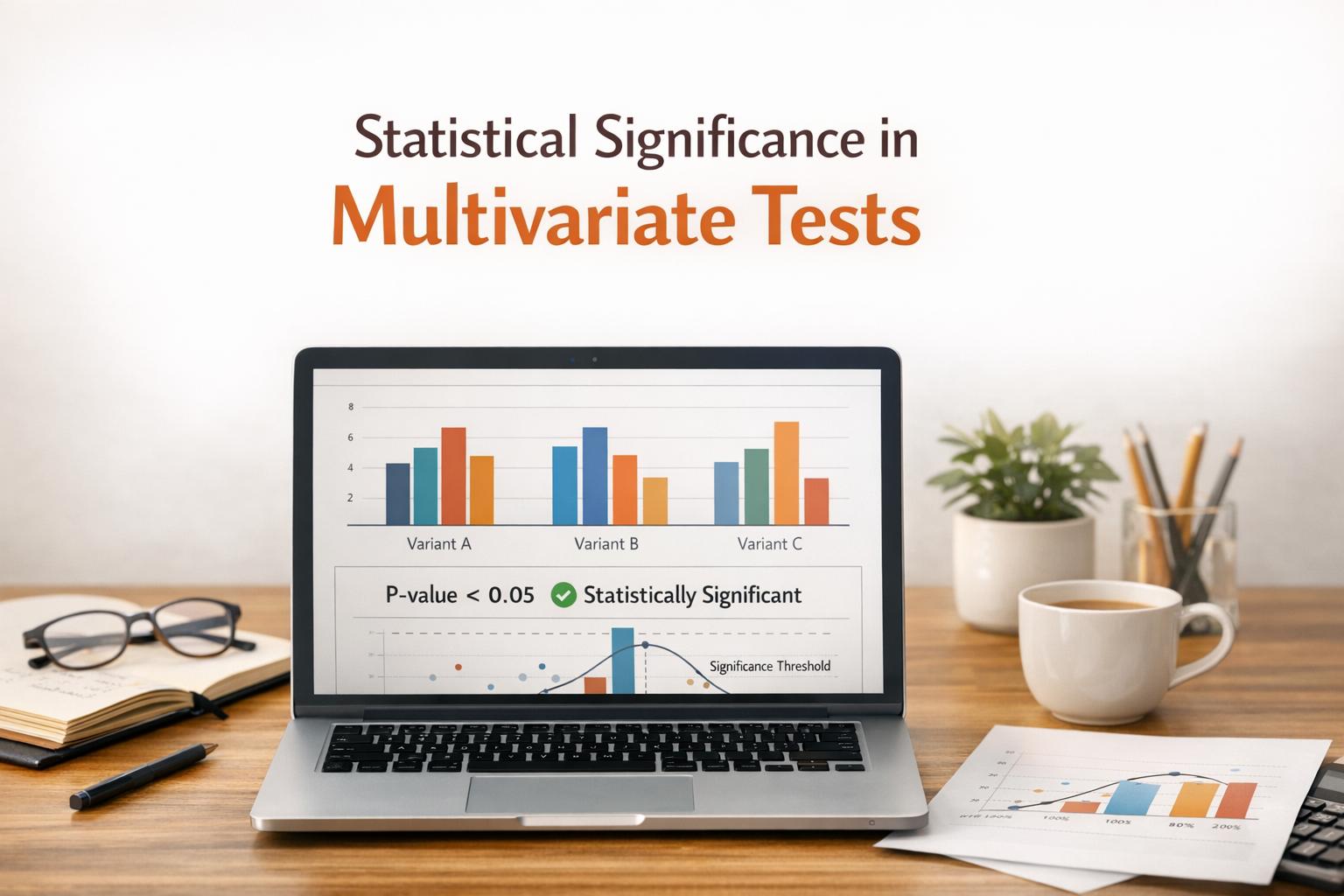
 24-01-2026
24-01-2026
 Ian Naylor
Ian Naylor
Statistical Significance in Multivariate Tests
How to get reliable results from multivariate tests using fractional designs, statistical corrections, variance reduction, and AI automation.
